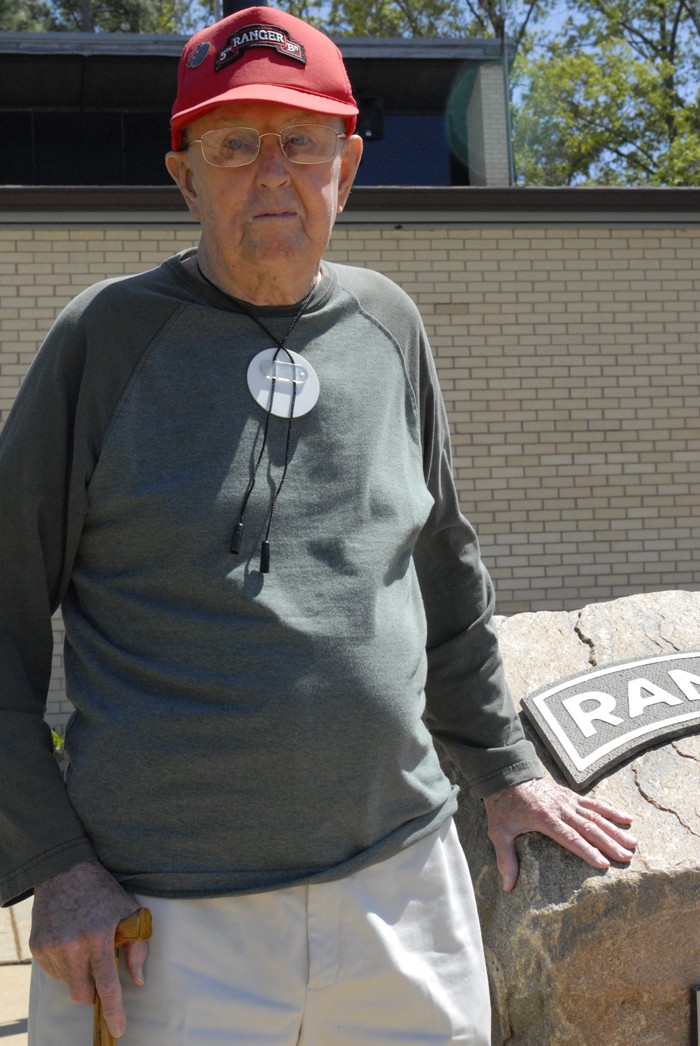FORT BENNING, Ga. - William Boyd said he rarely misses the Best Ranger Competition - even if it means not telling relatives about his weekend travel plans.
The 87-year-old former Soldier who trained at Fort Benning in the early 1940s and participated in D-Day was back on Harmony Church for this year's installment. He began attending BRC in the late 1990s and drives up to Columbus every year from his home in Sun City, Fla.
"I enjoy it here. I get a chance to talk to some of the old guys," he said Saturday. "This is the only place where I can talk about what I did. They're my contemporaries. A few have passed away and most are younger now, but we're a pretty close-knit group."
Earlier this year, Boyd was elected president of a World War II association for those who served in Ranger battalions. The group has reunions on a regular basis.
A native of Point Pleasant, N.J., he first joined the Army National Guard in 1939 at age 16. He got transferred the following year into the 44th Infantry Division, which had been activated ahead of World War II. At the time, his base pay was about $30 a month.
But in June 1941, about six months before the Japanese attack at Pearl Harbor, the Army discovered Boyd was underage and kicked him out of the service, he said. He briefly went into the Canadian army before returning to the U.S. Army 10 months later.
In the summer of 1942, he was sent to Fort Benning and linked up with the 11th Armored Regiment, 10th Armored Division, at Sand Hill. He initially trained on light tanks and wound up getting reassigned to an Armored Infantry unit on post.
"It was hot down here - nothing but sand and pine trees," he recalled. "It was miserable out there. Everything was centered on Main Post. A bus ran out to Sand Hill maybe once or twice a day.
"Our training was tough and the conditions weren't too good. It was hot, sandy and there were no swimming pools around I knew of. There was good boxing on Sand Hill at the time."
Back then, the tricommunity wasn't the relatively tranquil place it is today, either, he said.
Some Columbus residents posted signs telling Soldiers they weren't welcome and to keep off the grass. Just across the bridge in Phenix City sat a notorious "strip" of at least eight seedy bars on both sides of the street. Fights were commonplace and U.S. paratroopers dominated the area.
Being from the North didn't help matters for Boyd and he often got called a "Yankee," he said.
"You had to walk down the middle of the street in Phenix City," he said. "If you walked too close to one of the bars, you might get hit. I got robbed once walking outside. The area was so bad it got put off limits to military later on after I left."
Boyd volunteered for Ranger duty in 1943 and was selected to join the 5th Ranger Battalion, which formed in September that year in Tennessee.
"Nobody knew what the Rangers were," he said. "It took many years, even after the war, till people knew who they were. ... Someone asked me why I wanted to join and I said, 'They're like the commandos.'"
On June 6, 1944, Boyd was with the battalion's E Company on D-Day when it stormed Omaha Beach as part of the Allied invasion of German-occupied France.
"The British navy took us in. We got on the beach and got off the boat," he recalls. "It was low tide; we had almost 100 yards of sand and we were crawling. Things were hitting the sand all around, and we realized the Germans were shooting at us.
"We were all scared to a certain point. ... All I remember hearing was, 'Get off the (expletive) beach!'"
E Company moved inland, past the initial German defenses, and it led to the birth of a slogan.
"Rangers Lead The Way - that's where the motto came from," he said.
Other units weren't so fortunate. Boyd said the company to the right "got slaughtered," and the situation grew even rougher immediately after his group advanced beyond the beach.
Bodies lie everywhere, and he watched a bunch of American glidermen get shot up by the Germans as they attempted to land on the battlefield.
"When I close my eyes, I can still picture that," he said. "They never had a chance."
Boyd was wounded on separate occasions during the war in September 1944 and March 1945. He was discharged from the Army after serving four years.
The World War II veteran said his family had reservations about him making the trip to Fort Benning this year. About three months ago, he tripped and fell face-first in a parking lot near his Florida home. He'd never fallen before, but drove himself to the hospital.
But he decided to come up here anyway.
"The Rangers are family, too," he said. "I can relax here. I love it - I see all these young guys knocking their brains out (in the competition), and I think it's great."


Social Sharing